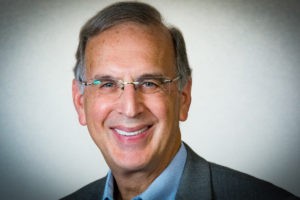We can all agree that the Jewish community is changing – rapidly. Depending on who you ask, this is either a crisis or par for the course.
Rabbi Schwarz thinks it’s an opportunity.
“We’re living in an age where the large institutions that have defined organized Jewish life for several generations are losing market share,” says Schwarz. “Demographers who are taking that information and concluding that people are abandoning Judaism are mistaken.”
Rabbi Schwarz will share his thoughts on harnessing this opportunity at the second annual Harry Kay Leadership Summit on April 29. The Summit is a free event open to the entire community.
“There are stirrings of Jewish revival,” says Schwarz in his 2013 book Jewish Megatrends: Charting the Course of the American Jewish Future. That revival, he continues, is coming in the form of emerging and new platforms that look very different from legacy Jewish organizations — and the next generation of Jews is embracing them.

Rabbi Sid Schwarz
In 2017, Schwarz began Kenissa: Communities of Meaning Network to help these emerging platforms thrive and build bridges between them and the well-established legacy organizations. Kenissa – the Hebrew word for “entryway” – is currently working with 300 organizations, ranging from modern-day moshavs on the East Coast to a certain community website in the Twin Cities. (hint: it’s this one.)
“Rabbi Sid has understood for longer than most of the rest of us that the Jewish world is changing and that in order to survive, we must adapt,” says Libby Parker, Jewfolk’s Executive Director. “Rabbi Sid also fundamentally understands the role of the Jewish professional and the Jewish lay leader and the interplay of those roles. He speaks clearly about how communities as a whole must adapt to new demands, new challenges, and a more personalized Jewish experience for each individual.
Kenissa focuses on six areas of activity Rabbi Schwarz sees as the focus for the Jewish community of the future: social justice, Jewish learning groups, new spiritual communities, arts and culture, Jewish environmentalism, and spiritual practice.
“All of these sectors are attracting next generation Jews in ways that legacy organizations are failing to do,” says Schwarz. “Each one has a success story to tell.”
“Anyone in the Twin Cities community who is concerned about the Jewish future, hopeful about the Jewish future, or has any stake in it at all, should come to the Leadership Summit,” says Lauren Kaplan, Harry Kay Center for Leadership Excellence Director. “The Harry Kay Center for Leadership Excellence’s mission is to inspire and assist emerging leaders in addressing the issues and challenges facing Jews. Rabbi Sid’s entire body of work addresses these issues — effectively. We’re thrilled that the Twin Cities has the opportunity to learn from him.”
Harry Kay Leadership Summit | April 29 | 7 pm | Free, open to all
Presented by the Harry Kay Alumni Network, in partnership with the Minneapolis Jewish Federation and the St. Paul Jewish Federation.















Glad you included this. The reality here in the Twin towns is we lack pulpit rabbis able/willing to push for direction befitting a changing Jewish community. I say “pulpit” rabbi because even in 2019, the sacred institutions remain the soapbox for thoughts regarding the future.
We have a variety of Jewish clergy at our area shuls. In my opinion, they choose not to take risks by maintaining philosophies and practices of the last 1/2 century.
Within various congregations across the country there does exist outreach programming led by rabbis who’s job is to redefine Judaism for coming generations. Not here.